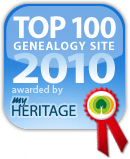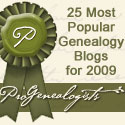I first found out about Ancestry’s Internet Biographical Collection on Monday from Dick Eastman’s blog. I didn’t pay much attention, but I noticed that several people were rather angry about the collection.
Then, on Tuesday, Janice of Cow Hampshire left on comment on my blog alerting me to the fact that Ancestry had cached my blog in the Internet Biographical Collection and was requiring a paid subscription to view the cached pages. Thanks, Janice. You got my attention.
Viewing the Cached Pages
By the time I looked at the collection, Ancestry had already made changes, making the Collection a free database and including a link to the original website on the record page. I did not see the original presentation of the database that originally created so much furor.
The current format of Ancestry‘s cached database is not much different than the search results obtained from Google, Yahoo!, or the Internet Archive Wayback Machine. My blog is cached in all those places. One notable difference, though, is that the cached pages on Google and Yahoo both include a disclaimer at the top of the cached page indicating that the content does not belong to them. Ancestry and the Wayback Machine currently do not include such disclaimers.
How Can I Enforce My Copyright?
My blog is protected by copyright. A while back, an attorney who specializes in copyrights, patents, and trademarks recommended that I add a copyright statement on my blog. While a copyright notice is not required in order to protect my creative work, the notice is intended to remind others that the work is, indeed, copyrighted.
However, to file suit to enforce the copyright, I must register my creative works with the United States Copyright Office. Online works must be submitted in full, regardless of length, either on CD or in printed form and a $45 fee must accompany the registration. If the work is not registered, I cannot sue to enforce the copyright.
If I register the work, I can sue for actual damages. Given that I don’t make any money on this blog, I’d have a hard time proving actual damages. But, if I had registered the creative work before the act of infringement, I could sue for statutory damages up to $150,000 without the need to demonstrate actual damages.
Unfortunately, a district court in Nevada determined that Google’s cache complied with Fair Use in the United States. If authors don’t want their website or blog cached, the author must take the initiative to prevent their online works from being cached. Other genealogy blogs have mentioned ways to do this. Note that this same precedent may not apply in other countries, however.
With all this information, it seems that it’s up to me to ensure that my blog is not cached . A lawsuit would probably not be productive.
Be aware that I am not a lawyer and I am not qualified to give others legal advice. The discussion above is based on my own limited understanding of copyright law.
To Cache or Not To Cache?
One problem with online information is that content that’s here today may be gone tomorrow. If my blog is removed from the Internet, the cache may be the only way to recover the information previously there. Broken links abound on the Internet. So do cached representations of what was once located on missing web pages.
If I decide to stop paying for web hosting, my blog will disappear. If someone who uses free hosting through Blogspot, WordPress, LiveJournal, etc. doesn’t post anything for a while, the host may delete the blog. The content would be lost unless cached.
If, however, I want to erase all traces of my blog from the Internet, cached remnants may remain. I guess this means that we should be careful when posting information on the Internet. Once posted, it may be cached forever. Or maybe not. It all depends on how long the cache is preserved.
So What Will I Do?
Since Ancestry is now allowing free access to the cached pages of my blog and is now providing a more easily located link back to my blog, I don’t have any significant issues with my blog being cached by Ancestry. At this point, the cache appears to be little different than the caches maintained by Google, Yahoo! and the Wayback Machine. If I don’t like the idea of my blog being cached, I can take steps to prevent cached posts from all sources, not just Ancestry.
The debut of Ancestry’s Internet Biographical Collection has generated a lot of justifiable anger. I’m grateful to those whose posts and comments encouraged Ancestry to change their policies on this database. I’m also encouraged by the fact that Ancestry actually listened.
With luck, someone may actually find my blog through the cache on Ancestry, and I’m all for that. And, if Ancestry continues to maintain the cache of my blog after the blog itself ceases to exist, well I’m all for that, too.
Copyright © 2007 by Stephen J. Danko




Steve, I agree that what Ancestry is doing now with their “collection” is not any different than what the other search engines are doing. With two exceptions – you still have to register to see the pages AND it still appears as though it is their content. The issue I had to begin with, putting it behind their subscription wall, is no longer an issue, for now. I wonder what were they thinking?
Steve,
Thank you for the very interesting article. At this point I have the same concern as Becky. They list the “Source” (which usually indicates the owner in Ancestry’s case) as themselves. They may have hijacked the cache of my blog, but I still own the articles, and they need to acknowledge that.
Janice
Becky and Janice, both of you mention good points.
I, myself, solved the issue of registering to see the free pages at Ancestry by using a pseudonym and an AOL email address that I created specifically to use when I don’t really want to give out my personal information.
I really did intend to discuss the source citations that Ancestry uses, but several others have already done so. Let me just say the the source citation Ancestry uses is not consistent with the recommendations in Elizabeth Shown Mills’ new book “Evidence Explained”. At the very least, Ancestry should conform to the accepted genealogical standard for citing sources.
Thank you both for your comments!
Very thoughtful, Steve. Thanks for sharing your ideas.
Latest epinions.com review of Ancestry.com tells the truth, and got comments from Ancestry.com about having “agenda”…. too funny
http://www99.epinions.com/content_402044784260
I have been told that the ‘original’ terms that we signed with FREEPAGES had a clause that they could change the terms at any time.
And that they did and part of the new terms were that by posting on Freepages that the poster was SHARING their copyright with Freepages (ANCESTRY)??
IS THIS TRUE ???
If so what if I want to sell one of my images, do I need ‘permission’ form my shared copyright holder???